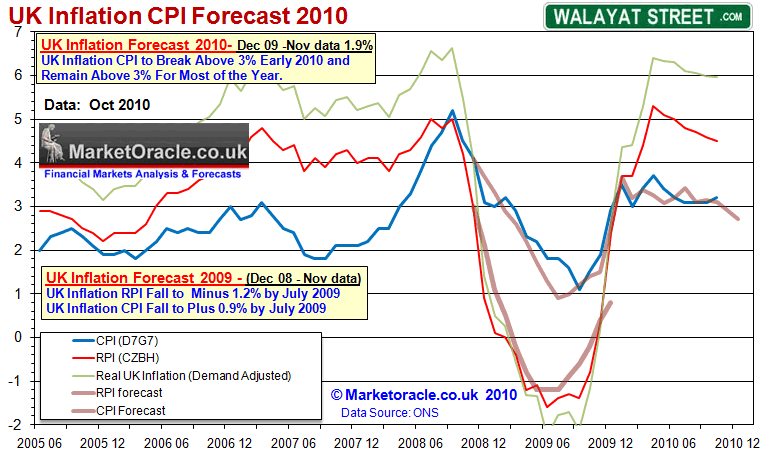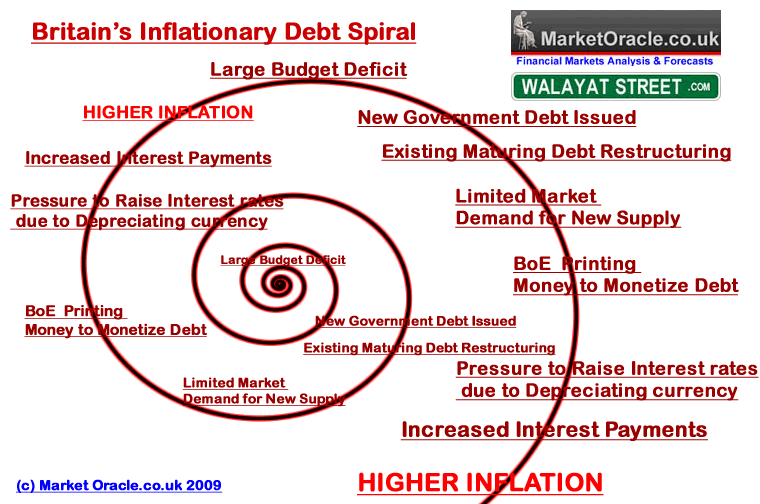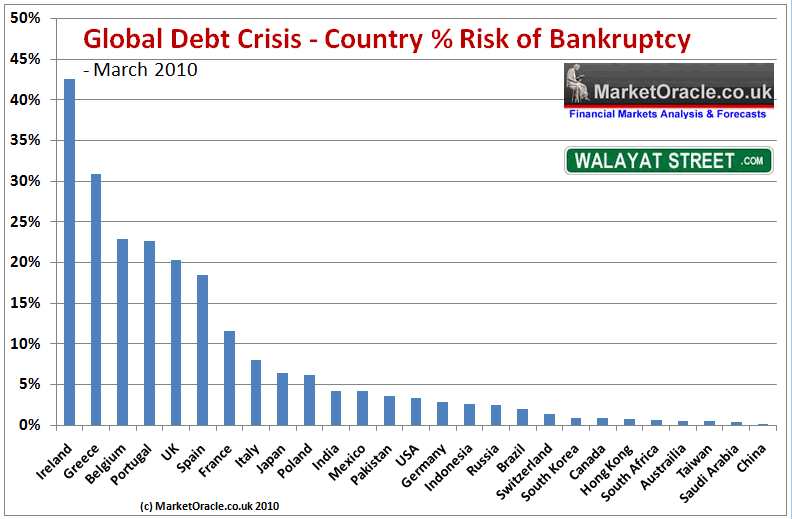Euro Debt Crisis Bankruptcy Bailout Queue, Protect Savings & Deposits From Banks Going Bankrupt!
Personal_Finance / Credit Crisis 2010 Nov 26, 2010 - 01:14 AM GMTBy: Nadeem_Walayat
 The global banking system that publicly went bankrupt during September 2008 prompting government interventions in the form of capital injections, buying of toxic assets, insurance of bad debts and even outright nationalisation's has started to bankrupt the states that bailed them out, starting with the smaller states with Iceland setting the ball rolling, and this year the bailiffs came knocking on the doors of the Eurozone club members, with first Greece, and now Ireland requiring a Euro-zone bailout (German) to prevent debt default bankruptcy, where if one falls then soon would all of the dominos tumble.
The global banking system that publicly went bankrupt during September 2008 prompting government interventions in the form of capital injections, buying of toxic assets, insurance of bad debts and even outright nationalisation's has started to bankrupt the states that bailed them out, starting with the smaller states with Iceland setting the ball rolling, and this year the bailiffs came knocking on the doors of the Eurozone club members, with first Greece, and now Ireland requiring a Euro-zone bailout (German) to prevent debt default bankruptcy, where if one falls then soon would all of the dominos tumble.
The Euro 200 billion bailout out of Greece and Ireland is in the form of a series of loans set at a 5% interest rate, against which one can measure the relative credit risks in the market as theoretically 5% should be seen as a cap with the view that market rates should be below the 5% bailout rate. However the bond markets are NOT responding positively to Ireland's bailout as they had done during May's Greece bailout, which is evidenced by the yields on 10 year euro-zone sovereign bonds rising across the board:
Greece's 10 year yield continues to trade at a high 12% despite the Euro 110 billion bailout at 5%, because Greek bond holders continue to discount a highly probable eventual debt default / restructuring as a deflating economy has sent public debt to GDP soaring to 135%.
Ireland's yield has surged higher to stand at 9.2%, following Monday's bailout low of 8%, again suggesting debt restructuring given depression inducing public debt at 95% of GDP.
Portugal's yield has crept higher to a new credit crisis high of 7.1% from Mondays low of 6.7%, confirming that a bailout of Portugal at an estimated Euro 40-80 billion is imminent for an uncompetitive economy carrying a rising debt to GDP ratio at 83%.
Spain's yield has now crossed above the 5% bailout rate to 5.2%, which suggests that the market is pricing in a bailout for Spain, which is not surprising given the exposure of Spanish banks to Portuguese debts, official debt is put at 64% of GDP but this does not fully take into accounts Spanish banks bad debts that as with Ireland could easily send Spain's debt to GDP to well over 100%.
Italy's yield has trended higher to 4.42% putting Italy firmly in the queue for a debt crisis blowout given that public debt is already at 120% of GDP.
Belgium's yield rose to 3.7%, which illustrates an elevated risk as a consequence of the failure of the political parties to form a new government and public debt is already at 100% of GDP.
UK - Whilst not part of the eurozone has seen its 10 year yields continue to trend higher to 3.3%, marginally below the recent high of 3.4%. The lower UK yield despite Britains huge debt mountain illustrates the flexibility afforded by being OUTSIDE the euro-zone as it allows Britain to continue to stealth default on its debts by means of printing money induced high inflation that the Eurozone countries cannot do individually I.e. the UK government prints money that it loans to the bankrupt banks at 0.5% to buy UK government bonds at 3.3%, hence why the yields are lower than the likes of Spain and Italy, which acts as a safety valve preventing outright bankruptcy but the price paid is in high inflation, with the doctored official inflation measure of CPI is at 3.2%, the more recognised RPI at 4.5% and real inflation at 6% as the following graph illustrates.

The CPI inflation trend is inline with forecast expectations as of December 2009 (27th December 2009 (UK CPI Inflation Forecast 2010, Imminent and Sustained Spike Above 3%)
France's yield at 3.14 illustrates that France still retains some room for manoeuvre despite being in the Euro-zone.
Germany, the primary funder of the Euro-zone bailouts and also the benchmark for where the Euro-zone debt collectively used to trade, saw its 10 year bund yields rise a little to 2.7%.
The Debt Interest Spiral
Virtually all countries continue to run huge budget deficits well above the 3% limit / targets that ensure the total debts will continue to grow which means if the economies fail to grow GDP faster then they accumulate debt, then Debt as a percentage of GDP will grow even faster thus triggering an out of control debt interest spiral as warned off in December 2009 (03 Dec 2009 - Britain's Inflationary Debt Spiral as Bank of England Keeps Expanding Quantitative Easing ).

The problem for the bankrupting PIIGS remains is that they cannot inflate their way out of debt, therefore economic austerity resulting in contracting economies means an ever higher debt burden which means that ALL of the bailed out countries will require further bailouts down the road as their debt mountains continue to grow. Thus ultimately the bailouts are just delaying the inevitable debt defaults / restructuring.
Again I have to reiterate - DEBT DEFAULT IS INEVITABLE, with Greece and Ireland now at the top of the Debt Default List. With the first in the queue to experience default being bond investors that have loaned monies to the bankrupt banks. Clearly the Euro-zone is attempting to delay inevitable debt default until the Euro-zone financial system has repaired itself enough to withstand a Greece and Ireland default.
The Euro-Zone Bankruptcy Queue
My original analysis of the countries at the highest risk of going bankrupt of March and April 2010 (13 Apr 2010 - Britain's Accelerating Trend Towards High Inflation and UK Debt Default Bankruptcy ) warned that a far bigger problem was brewing in Ireland that would blow up over the coming months during which period the mainstream press has been focused on Greece. If it were not for the E.U. bailout than Ireland and Greece would have gone the way of Iceland i.e. bankrupt.

However as the graph illustrates the risk of bankruptcy does not stop with Ireland and Greece, as whilst the mainstream press has finally woken up to Portugal being next, however they still are asleep to the third country on my list of countries most likely to go bankrupt, requiring a bailout namely Belgium, which in fact at the time I rated as being a head of Portugal.
The current state of the trends towards bankruptcy taking the earlier bond yields analysis into account suggests that the situation for Portugal, Spain and Italy has deteriorated since my original analysis of March 2010, and improved for the UK and to a lesser extent for Belgium, therefore I would now rank the bankruptcy order as :
Greece - Bust requiring bailed Euro 110 bailout
Ireland - Bust requiring Euro 85 billion Bailed out
Portugal - Pending an imminent bailout of approx Euro 40-80 billion
Belgium - Pending bailout of approx Euro 50 billion.
Spain - Pending bailout of approx Euro 400 to 500 billion.
Italy - Pending bailout approx Euro 1 trillion+.
According to May's bailout of Greece, the total funds made available to bailout the Euro-zone members was put at Euro 750 billion. Therefore after Portugal, there would just not be enough to bailout Spain that could reach as high as Euro 500 billion, which is why the Chancellor Angela Merkel made the statement on Nov 25th, warning bond investors that they should prepare themselves for a haircut as debt is restructured (partial default).
“Do politicians have the courage to place the risk burden on those who make money? Or is trading in sovereign debt the only business in the world in which there is no need to take risk?” and “This is about the primacy of politics, this is about the limits of the markets.”
Off course the Eurozone could do what the U.S., Japan and UK are doing which is to say to hell with it, we are just going to keep printing money and monetizing government debt forever! Though the German memories of the 1920's hyperinflation and subsequent collapse of the German state into a long depression that gave rise to the Third Reich is strong enough to suggest that after Portugal, a bailout of Spain and others will be accompanied by increasingly heavy losses for bond investors and highly likely bank depositors which would therefore impact everyone regardless of where they reside.
BREAKING NEWS INSERT - The most recent breaking news coming out of Germany is for a doubling of the Euro 750 billion bailout fund to Euro 1.5 trillion, which is clearly to address the increasing speculation around the fact that the balance of the existing fund would not be enough to bailout Spain, which as earlier analysis shows has tipped into the bailout zone during recent days.
UK Savers Need to Plan Ahead For a Banks Going Bankrupt
My focus from this point forward will be on the risks of UK's bankrupt banks bankrupting Britain, whilst the risk is relatively low at about 17%, however there is the contagion factor where a cascade of bankrupting Eurozone countries that UK banks are exposed to such as Spain, Italy or even France would bring Britain down with them. Especially as Britain would NOT survive a collapse of the Euro-zone which many UK Euro-skeptic politicians gleefully look forward to without contemplating the consequence in terms of the accompanying collapse of economic activity that would make the Great Recession of 2008-2009 look like a picnic.
However the UK going bankrupt would not mean that the government would default on its debts, instead it would seek to inflate them away at a far faster pace than it already is with real inflation reaching in the region of 20% per annum, which given recent trends in inflation implies a CPI of about 10% as the earlier inflation graph illustrates. However a bankrupting state would mean savers would not only lose the value of their savings as inflation erodes it by as much as 20% per annum. But that the government would seek to restructure bank debt which means bond holders would take a hit and in a worse case scenario the government would be forced into nationalisation and restructuring the whole banking sector which means that savers could lose deposits over the FSA limit of £50,000 per banking group.
Whilst the worst case scenario at this point in time is not on the horizon, however that does not mean that savers would be fully protected if a country such as Spain goes bust where a bailout would require it's banks be restructured including loss of depositor cash upto a certain limit as occurred following Iceland's bankruptcy. In such an eventuality given the size of UK depositor funds with the likes of Spain's Santandar, the government may be forced to only cover UK depositors upto the FSA limits.
Santandar and other foreign banks have been allowed to run amok amidst Britain's retail banking sector as a consequence of an incompetent regulator and a desperate government eager for anyone to take on the responsibility of restructuring a string of bankrupt banks which allowed Santandar to gobble up a string of UK small to medium sized banks which now poses a real risk to UK depositors.
The only way people can protect themselves against a risk of bankruptcy triggering the FSA limit protections is by ensuring that deposits per banking GROUP are under the FSCA compensation limits which are currently £50,000, and from 1st of January 2011 will rise to Euro 100,000 or about £83,000.
However savers with amounts deposited above the guaranteed limits need to ensure that they have measures in place well ahead of a banking crisis to ensure that they survive one both in terms of the ability to transact business as well as ensuring total funds exposed are LESS than the banking limits at the time of a bank run.
Scare Mongering ?
Am I scare mongering? Try asking those that were locked out of their savings accounts when the Icelandic banks went bust during October 2008. The banks froze UK customers out of their accounts on the 7th of October 2008. My analysis of 2nd October 2008 had warned that small countries such as Iceland were at risk of going bankrupt, with Iceland's bankruptcy preceded by some 24 hours earlier by Iceland Going Bankrupt?, - "savers should at the first opportunity seek to repatriate their savings to a 100% UK bank as the consequences of a country going bankrupt could render guarantees meaningless".

Still think I am scare mongering ?
Did you know that funds deposited by some 2 million UK depositors with the Post Office are not guaranteed by the UK FSCS ? Which are in fact guaranteed by the Irish government. This illustrates why savers need to be aware of the risks and make appropriate contingency plans for when the SHTF. Now for some good news for Post Office savers, the Bank of Ireland (operates Post Office accounts) is in the process of transferring its Post Office depositor base to fully fall under the UK regulator and compensation scheme as per a statement of 1st November 2010, with more clarification pending.
However UK savers HAVE been blindly thinking for the past 2 years that their savings were safe in the British Post Office, when all along they were no more secure than in any other Irish bank so could have just as easily woken up to a shock Iceland style.
UK Savers Emergency Plan:
a. Ensure that you have at least 2 current accounts across banking groups.
b. That you have procedures in place to ensure that you can act fast to initiate transfer of funds from instant access savings accounts, especially if your total funds with a particular banking group exceeds £50k / £83k (1st Jan 2011).The best strategy is to limit exposure per banking group to the limit.
c. Do not have ANY savings are fixed deposit exposure to banks that do not fall under the UK Financials Services Compensation Scheme.
d. Limit exposure to PIIGS banks, that is Greece, Ireland, Spain, Portugal and Italy as these are at the most risk of going bust thus triggering a lengthy process of Savers having to wait for compensation.
The following list represents Britians' largest deposit taking banking groups and the banks that fall under each.
Note whilst banking groups may have multiple licences as a consequence of mergers and takeovers, however they also may be in the process of merging licences so for ultimate safety one should remain focused on banking groups.
LLOYDS BANKING GROUP
- Lloyds TSB Bank
- AA Savings
- Bank of Scotland / HBOS
- Birmingham Midshires
- Capital Bank
- Cheltenham & Gloucester Savings
- Halifax
- Intelligent Finance
- Saga
SANTANDAR GROUP
- Santandar bank
- Abbey National
- Asda Savings
- Alliance and Leicester
- Bradford and Bingley
- Cahoot
- Moneyback
- Honycomb
Nationwide Building Society
- Nationwide Building Society
- Cheshire Building Society
- Derbyshire Building Society
- Dunfermline Building Society
BARCLAYS GROUP
- Barclays Bank
- Standardlife Bank
HSBC GROUP
- HSBC Bank
- First Direct
- Marks and Spencer Financial
ALLIED IRISH GROUP
- Allied Irish Bank
- First Trust
CITI GROUP
- Citibank
- Egg
CO-OPERATIVE GROUP
- Co-operative Bank
- Britannia
- Smile
- Unity Trust Bank
RBS Group
- Royal Bank of Scotland
- Nat West Bank
- Direct Line Savings
- Lombard
- The One Account
- Drummonds
- Ulster Bank
Additional comments
- Foreign Banks under UK FSCS Scheme - ICICI (India), First Save (Nigeria)
- Small business are covered by the FSCS on the basis of 2 of following 3 conditions - upto a turnover of 6.5 million, less than 50 employees, balance sheet total not more than £3.26 million
Banks not under the UK FSCS.
-
Post Office - Currently Guaranteed by the Irish Government, pending coming under the UK FSCS.
-
ING Direct, Tridos - Dutch
- Anglo Irish, Bank of Ireland - Ireland
Don't delay! Act today to form a quick personal savings protection contingency plan, otherwise you may wake up one day to find yourselves locked out of your funds Iceland style!
For more on how to protect your wealth from debt default bankruptcy see the Inflation Mega-trend Ebook (FREE DOWNLOAD)
Comments and Source: http://www.marketoracle.co.uk/Article24572.html
By Nadeem Walayat
Copyright © 2005-10 Marketoracle.co.uk (Market Oracle Ltd). All rights reserved.
 Nadeem Walayat has over 20 years experience of trading derivatives, portfolio management and analysing the financial markets, including one of few who both anticipated and Beat the 1987 Crash. Nadeem's forward looking analysis specialises on UK inflation, economy, interest rates and the housing market and he is the author of the NEW Inflation Mega-Trend ebook that can be downloaded for Free. Nadeem is the Editor of The Market Oracle, a FREE Daily Financial Markets Analysis & Forecasting online publication. We present in-depth analysis from over 600 experienced analysts on a range of views of the probable direction of the financial markets. Thus enabling our readers to arrive at an informed opinion on future market direction. http://www.marketoracle.co.uk
Nadeem Walayat has over 20 years experience of trading derivatives, portfolio management and analysing the financial markets, including one of few who both anticipated and Beat the 1987 Crash. Nadeem's forward looking analysis specialises on UK inflation, economy, interest rates and the housing market and he is the author of the NEW Inflation Mega-Trend ebook that can be downloaded for Free. Nadeem is the Editor of The Market Oracle, a FREE Daily Financial Markets Analysis & Forecasting online publication. We present in-depth analysis from over 600 experienced analysts on a range of views of the probable direction of the financial markets. Thus enabling our readers to arrive at an informed opinion on future market direction. http://www.marketoracle.co.uk
Disclaimer: The above is a matter of opinion provided for general information purposes only and is not intended as investment advice. Information and analysis above are derived from sources and utilising methods believed to be reliable, but we cannot accept responsibility for any trading losses you may incur as a result of this analysis. Individuals should consult with their personal financial advisors before engaging in any trading activities.
Nadeem Walayat Archive |
© 2005-2022 http://www.MarketOracle.co.uk - The Market Oracle is a FREE Daily Financial Markets Analysis & Forecasting online publication.



